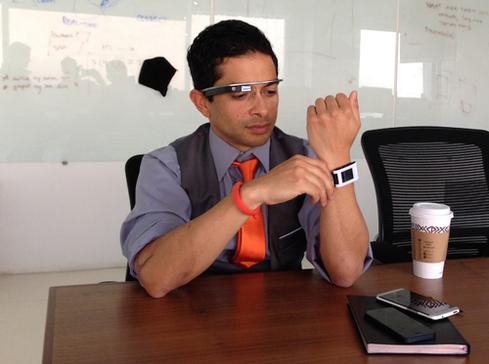GE CEO Talks Economy, CIOs & TechGE CEO Talks Economy, CIOs & Tech
GE CEO Jeffrey Immelt shares three quick insights and explains why he sees no chance of the CIO's role diminishing.


Wearables At Work: 7 Productivity Apps
Wearables At Work: 7 Productivity Apps (Click image for larger view and slideshow.)
I heard GE's Jeffrey Immelt speak last week, and I thought our IT community members would like to hear what the CEO of a $150 billion-a-year company is thinking about the economy, technology, and the role of the CIO. If anyone is trying to sell you on the diminished role for the CIO, IT organization, or technology pro, read on for a counterview.
The context: Immelt was speaking to IT leaders at a user conference for GE Intelligent Platforms, there to sell GE's software that manages and analyzes industrial data. Here are three nuggets I pulled out that I think CIOs will find interesting.
1. Economic outlook: Hunker down for more of the same
Immelt's one-sentence economic forecast: "I'd learn to love the world we're in today, because we're going to be in it for awhile." That world is characterized by relatively slow economic growth globally, with a ton of volatility.
The US is in better shape than anytime since the financial crisis, he said. China is growing, but the opportunities there are a "micro versus a macro story." Countries focused on natural resources are still investing, and there are pockets of high growth across the world, but Europe and Japan still are sluggish.
[More wisdom from GE's leader: Is 1% Improvement Boring, Or A Breakthrough?]
Overall, companies must "make their own growth, manage risks," but there are plenty of opportunities for companies that can do that, he said.
2. CIO's role: Teach business leaders to love analytics
"All our leaders are becoming as expert as possible in analytics," Immelt said.
He described a central role for the CIO in getting business leaders to use analytics more, but also the need for companies to bring in new technology skills.
"This has to be led by the CIO in many cases, but it also has to be led by people inside and outside your company. We've gone through this. We have brought people into GE from other companies -- Oracle, Cisco, other companies -- because we knew we couldn't get to where we needed to on our own. Cultural transformation, talent transformation are absolutely critical."
Two other nuggets Immelt shared about the role of the CIO at GE caught my attention. He's pushing his own CIOs for "more standardization in the name of flexibility," using the example of going from 600 ERP systems down to 34 (interesting that the CEO knows those numbers). And Immelt has the CIO leading GE's "factory of the future" initiative, which involves increased automation, new manufacturing techniques, and networking of sensor-packed production gear so managers can better analyze their operations and avoid breakdowns.
3. GE's three big strategic bets
"In order for us to be successful, we've got to invest in big themes," Immelt said.
GE's first big bet is on an "energy transition," particularly driven by the natural gas boom in North America and worldwide.
The second bet is on advanced manufacturing: "We think the nature of manufacturing is changing dramatically," he said. Improved automation tools, 3D printing, new materials, and the increased importance of analytical data coming off the factory floor and the supply chain mean that making stuff is increasingly dependent on IT.
The third is the Industrial Internet, GE's term for applying the Internet of Things to its industrial gear, medical equipment, and appliances.
Does Immelt's world sound like one where IT leadership, and the importance of centralized, integrated, secure information systems, are diminished? Do any of these functions sound like ones a chief marketing officer or chief digital officer is keen to take over?
Immelt focused on industries in which GE sells goods, but the demand for data-fueled business decisions holds just as true in retail, biotech, hospitality, media -- you name it. Immelt may have been selling, but I think companies had better be buying when it comes to this line: "Who uses that data the best I think will increasingly determine who's successful in the 21st century."
The Internet of Things demands reliable connectivity, but standards remain up in the air. Here's how to kick your IoT strategy into high gear. Get the new IoT Goes Mobile issue of information Tech Digest today. (Free registration required.)
About the Author
You May Also Like






